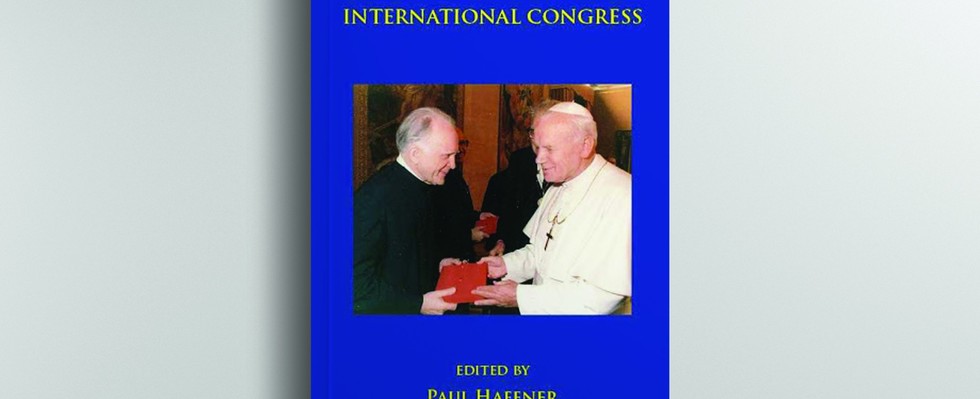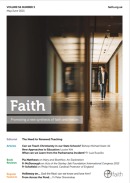Acts of the Stanley Jaki Foundation International Congress 2015 ed. by P. Haffner and J. Laracy
Review by Fr Conor McDonough
This is a curious book. It contains papers delivered at a 2015 conference at Seton Hall University on the thought of Fr Stanley Jaki OSB, the Hungarian physicist and theologian who published over five decades an immense range of original and provocative works on the nature of the natural sciences and their relationship with Christian faith. It is worth pointing out though, that this conference seems to have been focussed more on the propagation than the assessment of Fr Jaki’s ideas. For example, all bar two of the contributors are identified on the website of the Stanley Jaki Foundation as members of the “Stanley Brigade”, close friends, even fans, of the late Fr Jaki. Their commitment to the furthering of his great intellectual project is an admirable sign of their devotion, but it leads to a book lacking, for the most part, the genuinely critical engagement Jaki’s thought deserves.
Dishing out criticism
Jaki himself was well capable of dishing out criticism of ideas he regarded as problematic, as the third chapter of this book, by Msgr Richard Liddy, observes. Liddy, a longstanding colleague of Jaki at Seton Hall University, was certainly not a member of the “Stanley Brigade”. Although they worked together, and dined in the same room, Liddy explains that they never really got to know one another:
Although I encountered him numerous times, I never really had a substantive conversation with him [...]. The chief reason for [this] was that he was something of a curmudgeon who among other things, made it abundantly clear that he did not share my enthusiasm for the work of my teacher, the Jesuit philosopher-theologian, Bernard Lonergan [...]. So I was not inclined to seek Jaki out for conversation, a conversation laced with attacks in numerous directions: scientists in general, scientism in particular, modern culture, post-Vatican II theologians, etc. One could say he was an equal-opportunity controversialist. The list of his opponents was quite extensive (p. 76).
Even in chapters written by his friends, this abrasiveness and dismissiveness is mentioned. Stacy Trasancos recounts a story Jaki told himself of a graduate student in Rome who came to discuss his doctoral research at the end of one of Jaki’s lectures in the Angelicum. In reply, Jaki told the student to “give up his subject”, in a tone, Jaki later explained in his autobiography, that meant, “Would you, please, drop dead” (p.130). Such anecdotes are quite astonishing, but what emerges from them is an image of Jaki as a somewhat selfisolated figure, intelligent and prolific, but perhaps lacking in a collegial spirit that makes possible searching dialogue between peers.
Science and Christian Civilisation
Jaki’s central idea, outlined in this volume in three separate chapters which overlap to a large extent (Chapter 2 by Fr Joseph Laracy, Chapter 5 by Dr Stacy Trasancos, and Chapter 6 by Fr Paul Haffner), is the
claim, not only that Christian civilisation was hospitable to science, but that it was uniquely hospitable. Anyone familiar with the medieval history of science could agree with the more limited claim that the institutions and minds of Christian Europe were consistently favourable to the study of the natural world, especially from the twelfth century on, with the newly available writings of Aristotle providing both impetus and framework. One might even agree with Jaki and his disciples that the Christian understanding of God, creation, and salvation history provides an especially hospitable environment for the serious, methodical study of the natural world, more hospitable certainly than an animist worldview.
But this is not all that Jaki, or his disciples, want to say. They make the far stronger claim that in every other civilisation where science made a beginning, an inevitable “stillbirth” followed, precisely because of the lack of supporting ideas made known only by divine revelation (pp. 29-38, 138-140).
In order to make this claim, Jaki described supposedly scientific civilisations – Egypt, China, India, Babylon, Greece, and Arabia (sic) – as being fatally affected by “pantheism”, and therefore incapable of sustaining the scientific enterprise. I’m not at all qualified to speak on Egypt, China, India, or Babylon, but Jaki’s treatment of Greek and Arab thought, at least as outlined in this volume, seemed to me extraordinarily reductive, painting with broad brush-strokes in order to yield a picture that fitted Jaki’s central idea. To take just one example among many, Fr Joseph Laracy includes the Islamic world among the “pagan” civilisations who habitually “appeal to the capricious gods and goddesses, beset by very human passions for power and pleasure, to explain the natural world” (p. 65). I couldn’t help thinking that the 2010 publication, Creation and the God of Abraham (ed. Burrell, Soskice, Cogliati, Stoeger), with its detailed and nuanced treatment of medieval Christian, Jewish, and Islamic thought on God and creation, should be required reading for anyone seeking to assess Jaki’s claims, rather than merely to repeat them.
Historical claims
Apart from these philosophical claims, there is also the question of the historical claims involved in Jaki’s thesis that science was born of Christianity, and Christianity alone. Is it really true that science was stillborn in the Greek world, for example? What of the successive generations of late-antique Greek-speakers, pagan and Christian, who read and reacted to the works of Aristotle, yielding important figures like Ptolemy, Galen, and John Philoponus?
And is it true to say that science was stillborn in the Islamic world? One story about science and Islam, still popular among Catholic apologists, tells us that science flourished in Baghdad and Damascus towards the end of the first millennium, but that it did so in spite of Islam, and that the reassertion of the Quran’s superiority over philosophy by al-Ghazali and others in the eleventh century led to quick decline in Islamic science. Recent decades of research, however, have shown that this story simply is not true, and that considerable scientific advances continued to be made in various contexts in the Islamic world up to the sixteenth century. Howard Turner’s book, Science in Medieval Islam, published in 1995, demonstrates this dispassionately and shows how absurd is Jaki’s claim, repeated by Dr Stacy Trasancos in this volume, that in the Islamic world, “science [did not] become a self-sustaining enterprise” (p. 138).
Not just philosophy and theology
Finally, Jaki’s thesis, it seems to me, overestimates the role that philosophical and theological ideas play in history. Of course ideas matter, but so do institutions, and patronage, and the availability of texts. In spite of its access to theological truths about creation and history, the scientific enterprise remained very modest in the Christian West throughout the early Middle Ages, largely because it had lost contact with Aristotle’s framework and example. That changed when the Greek texts and methods long known in the Islamic world became available in Latin. Then the Latins found themselves joining a tradition of reading and thinking about nature that included generations of Greeks and Arabs, a tradition they were happy to honour with abundant citation (Albert the Great, for example, in his commentary on the natural works of Aristotle, refers often to Galen and to Avicenna, among many others). If this tradition ultimately flourished in the Christian West, being codified as the scientific method, while it died out in the Islamic world, this is surely largely to do with the institutional innovation of the network of universities, stable thanks to papal backing, which marked Europe out from the rest of the world.
Non-Christians can do science too
Jaki’s thesis, as outlined in this volume, is all about ideas: only Christians escape from pantheism, so only Christians can do science. This claim, however, is eminently controvertible, and it is a shame that this volume of studies failed to raise a substantial challenge to Jaki’s central idea.
Stanley Jaki was, without doubt, pioneering and indefatigable in his propagation of the great tradition of science in the light of the Gospel. As we take up his torch, and continue to make known the harmony between Christian faith and the natural sciences, we should be careful, I think, to take note of recent scholarship, and to avoid making overblown claims that undermine our case by undervaluing the contributions of non-Christians. The example of Jesuit astronomers is a good one to follow: when Grimaldi and Riccioli mapped the moon, they had the opportunity to name every peak and crater, but rather than honouring Christians alone, they included among the lunar placenames “Aristotle”, “Eratosthenes”, “Ptolemy”, “al-Bitruji”, “al-Battani”, “al-Zarqali”, and many more from beyond the Christian world. Thus they indicated and honoured a community of scientific reason, distinct from the community of faith. We Catholics who emphasise the congruity of reason and faith would do well to mark this distinction too.
Fr Conor McDonough OP teaches dogmatic theology at the Dominican House of Studies, Dublin.






